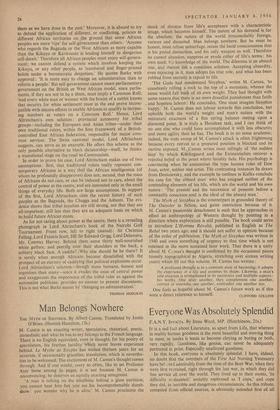Man Belongs Nowhere
THE MYTH OF SISYPHUS. By Albert Camus. Translated by Justin O'Brien. (Hamish Hamilton, 15s.) M. CAMUS is an exacting writer, speculative, rhetorical, poetic, immediate; and what he has to say belongs to the French language. There is no English equivalent, even in thought, for his poetry of speculation, his fearless lucidity which never leaves experience behind. Le Mythe de Sisyphe has waited thirteen years for an accurate, if occasionally graceless, translation, which is neverthe- less to be welcomed. The excitement of M. Camus's thought comes through. And if one would, every so often, like to set Professor Ayer loose among its pages, it is not because M. Camus is unconvincing; he deserves an equally exacting antagonist.
'A man is talking on the telephone behind a glass partition; you cannot hear him but you see his incomprehensible dumb- show : you wonder why he is alive.' M. Camus proclaims the
shock of divorce from life's acceptance with a characteristic image, which becomes himself. The nature of his demand is for the absolute; the nature of the world irreconcilably foreign, various and disunited. Man belongs nowhere. But he must be honest, must refuse subterfuge, retain the lucid consciousness that is his proud distinction, and his only weapon as well. Therefore he cannot abandon, suppress or evade either of life's terms : his own need; I'3 knowledge of the world. The dilemma is an absurd one, and therein lies a conscious solution. Accepting absurdity, even rejoicing in it, man adopts his true role; and what has been robbed from eternity is repaid to life.
'The Gods had condemned Sisyphus,' writes M. Camus, 'to ceaselessly rolling a rock to the top of a mountain, whence the stone would fall back of its ,own weight. They had thought with some reason that there is no more dreadful punishment than futile . and hopeless labour.' He concludes, 'One must imagine Sisyphus happy.' M. Camus does not labour towards this conclusion, but upholds both the world's weight and man's nature with the miniature exactness of a fine spring balance resting upon a diamond point. It is truly a Heculean task, and I can think of no one else who could have accomplished it with less obscurity
and more agility than he has. The book is in no sense academic; indeed, the wide sweep of M. Camus's attack is often frightening because every retreat to a prepared position is blocked and its motive exposed. M. Camus writes most tellingly of 'the sudden leap' by which Kierkegaard and the Existentialists recover a rejected belief at the point where lucidity fails. His psychology is convincing when he anatomises the type human roles of Don Juan, actor, soldier and artist. The contrasting instances he draws from Dostoievsky, and the example he outlines in Kafka conclude his case for 'the absurd man' who has resigned neither of the contending elements of his life, which are the world and his own nature: 'The present' and the succession of presents before a
constantly conscious soul is the ideal of the absurd man.'
The Myth of Sisyphus is the counterpart in grounded theory of The Outsider in fiction, and gains conviction because of it. M. Camus's passionate detachment is such that he approaches in effect an anthropology of Western thought by pointing in a direction where exploration is still possible. The book could serve to introduce L'Homme Revolte, published in English as The Rebel two years ago, and it should not suffer in opinion because of the order of publication. The Myth of Sisyphus was written in 1940 and owes something of urgency to that time which is not retained in the more sustained later work. That there is a unity about M. Camus's thought is confirmed by the occasional pieces
(mostly topographical to Algeria, stretching over sixteen writing years) which fill out this volume. M. Camus has written :
A profound thouglit is in a constant state of becoming; it adopts the experience of a life and assumes its shape. Likewise, a man's sole creation is strengthened in its successive and multiple aspects: his works. One after another,, they complement one another, correct or overtake one another, contradict one another too.
One feels as hopeful about M. Camus's future work as if this


































 Previous page
Previous page